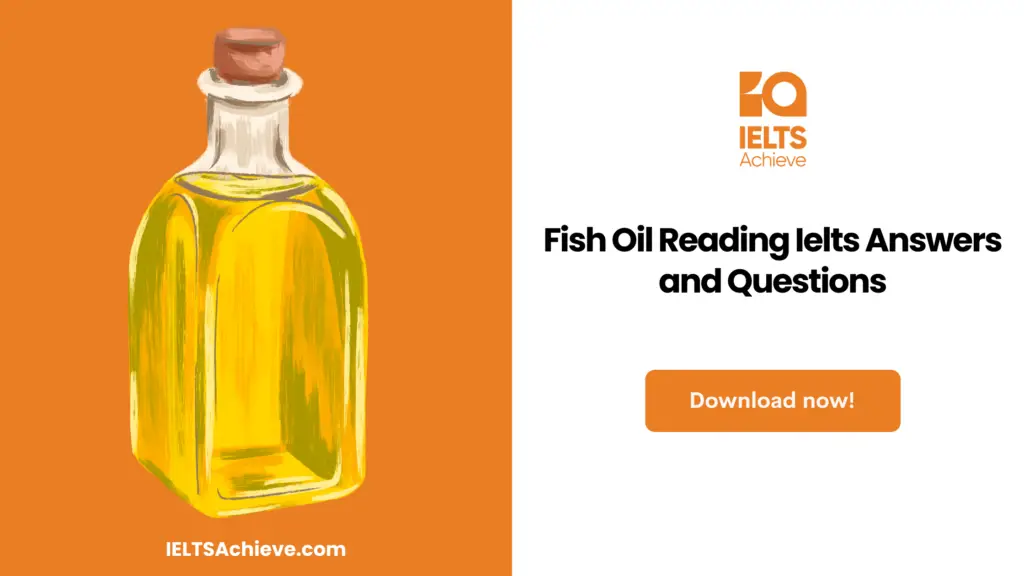The Blog post contains the following IELTS Reading Questions:
- IELTS Reading Yes No Not Given
- IELTS Reading Note Completion
- IELTS Reading Matching Information
Stay informed and prepared for success – Explore our comprehensive Reading Test Info page to get valuable insights, exam format details, and expert tips for mastering the IELTS Reading section.
IELTS Reading Passage – Fish Oil

Fish Oil
The advantages of fish oil seeked lots of attention. It is asserted that those who consume a significant amount of fish oil in their diet have a much lower risk of developing arteriosclerosis and heart disease. Apart from this, it has been demonstrated decisively that individuals with increased blood lipids respond well to therapy with fish oils.
Dietary research conducted on Inuit, Eskimos, and Greenland inhabitants around twenty years ago revealed the benefits of fish oil. It was discovered that the Inuit, whose traditional diet consisted of seal, whale, and arctic fish – a high fat diet had virtually no heart disease, had near zero prevalence of diabetes and enjoyed a comparatively very low rate of rheumatoid arthritis. Remarkably, the incidence of cancer in the traditional Input diet did not appear to differ from that of most other regions of the world.
Although a century-old awareness of Inuit customs, little attention was devoted to the ramifications of a fish-rich diet prior to the 1970s studies of Dyberg and Bang. After the research they’ve found that between 1950 and 1974, in a town of 1,800 people, there were merely three heart attack fatalities recorded. To understand the cause behind this, they analysed the Inuit’s blood lipids and nutrition of the Inuit. Omega-3 fatty acids were abundant in the bloodstream of the study participants, which was directly attributable to their diet.
Dyberg and Bang compared the Greenland Inuit societies with those Inuit living in Denmark who eat a diet nearly comparable to that of the Danes in order to rule out generic or ethnic influences. It was discovered that specifically those individuals who lived there for extended periods, had much higher blood cholesterol and triglyceride levels than their Greenland equivalents. In reality, the consumption rates of the Westernized Intuits were identical to those of the Danes, who consume mostly meat, dairy products and eggs. As anticipated, prevalence of heart ailment and arteriosclerosis among the Inuit who had settled in Denmark was much closer to that of the Danes than among the Greenland Inuit. According to the researchers, the findings revealed a shortage of omega-3 in the Danish diet comparable to the Greenlandic diet.
Similar discoveries emerge in Japan. The correlation between the health of the human heart and fish oil has been discovered together after examining the health records and mortality rates of the two groups as well as comparing the diets of farmers and fishermen. The average Japanese farmer has 90 grams of fish a day; whereas, the average fisherman has 250 grams. In virtually every way, their diets are identical. Accordingly, the fishermen had reduced blood pressure, heart disease, and rheumatoid arthritis rates.
This compared to the 20 grams that the average American consumes everyday, where heart disease and atherosclerosis are five to seven times more prevalent than in Japan. Fish oil’s strong omega-3 concentration and simple digestion make it a particularly effective therapy for hyperlipidemia. Studies have demonstrated an inverse relationship between salmon oil dose and plasma triglyceride levels. Distinctly, it has been determined that consuming three grams of salmon fish oil per day plasma triglyceride levels by around 32 percent in such patients. Six grams decreased concentrations by 41 percent, whereas nine grams decreased concentrations by an average of 52 percent in sufferers.
The table compares the Omega — 3 content of several fish species to that of a variety of vegetable oils and butterfat.
| Oil source | Proportion Omega-3 fatty acids in oil(%) |
| Anchovy | 7 |
| Soybean | 7 |
| Peanut | 0 |
| Mackerel | 62 |
| Olive | 1 |
| Salmon | 60 |
| Linseed | 49 |
| Tuna | 58 |
| Butterfat | 25 |
Unlock your full potential in the IELTS Reading section – Visit our IELTS Reading Practice Question Answer page now!
Recommended Questions:
Renewable Energy IELTS Reading Question with Answer
Fish Oil IELTS Reading Questions
Questions 1-5
Answer the question from Yes/ No or Not Given.
YES if the statement agrees with the views of the writer
NO if the statement contradicts the views of the writer
NOT GIVEN if it is impossible to say what the writer thinks about this
- Similar levels of Omega-3 fatty acids are consumed by Greenland Inuit and Japanese fishermen.
- Anchovy oil has approximately 10 times more Omega-3 fatty acids than a comparable amount of soybean oil.
- The Greenland Inuits have the lowest rates of rheumatoid arthritis in the world.
- Denmark Inuit blood cholesterol levels were lower than those of Danes.
- Diabetes is uncommon among the Inuit of Greenland.
Want to excel in identifying the writer’s views and claims? Click here to explore our in-depth guide on how to accurately determine Yes, No, or Not Given in the IELTS Reading section.
Questions 6-9
Complete the notes below. Write NO MORE THAN THREE WORD AND/OR A NUMBER from the passage for each answer.
6. The data found a similar deficiency of _______ in the Danish and Greenlandic diets.
7. To show the connection between the health of the human heart and fish oil, researchers analysed health records and ______ rates.
8. The typical Japanese fisherman consumes ____ grammes of fish every day.
9. In Japan, the ratio of heart disease to atherosclerosis is_______ times higher.
Questions 10-14
Match the information. Using the given information, determine the relation between given items.
PC if there is a positive correlation
NC if there is a negative correlationL/N there is little or no correlation
NI if there is no information
10. dietary proportion of traditional foods – cancer prevalence among Greenland Inuit
11. daily salmon dosage – plasma triglyceride levels
12. quantity of meat eaten – intake of Omega-3 fatty acids
13. Length of Inuits’ stays in Denmark – serum triglyceride levels
14. “Westernisation” of Inuit – consumption of Omega-3 fatty acids
Improve your performance in Matching Features questions by clicking here to access our comprehensive guide. Learn how to match specific features or characteristics with the options provided in the IELTS Reading section.
Unlock your full potential in the IELTS Reading section – Visit our IELTS Reading Practice Question Answer page now!
Recommended Questions:
Renewable Energy IELTS Reading Question with Answer
Fish Oil Reading Answers
1. Not given
2. No
3. Yes
4. Not given
5. Yes
6. Omega-3
7. Mortality
8. 250
9. Five to seven
10. L/N
11. NC
12. NC
13. PC
14. NC

We hope you found this post useful in helping you to study for the IELTS Test. If you have any questions please let us know in the comments below or on the Facebook page.
The best way to keep up to date with posts like this is to like us on Facebook, then follow us on Instagram and Pinterest. If you need help preparing for the IELTS Test, join the IELTS Achieve Academy and see how we can assist you to achieve your desired band score. We offer an essay correction service, mock exams and online courses.
